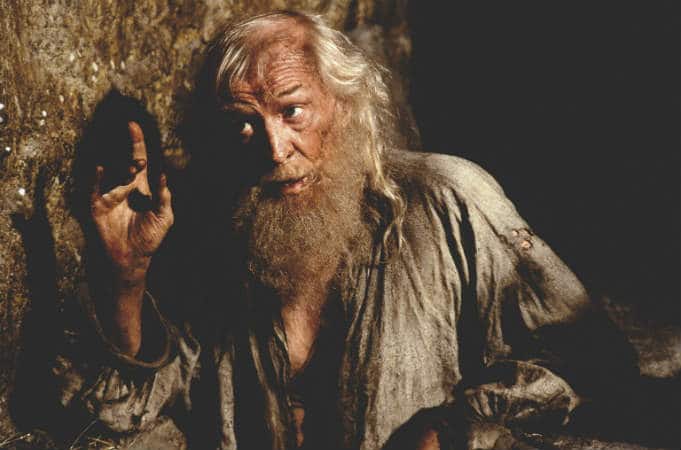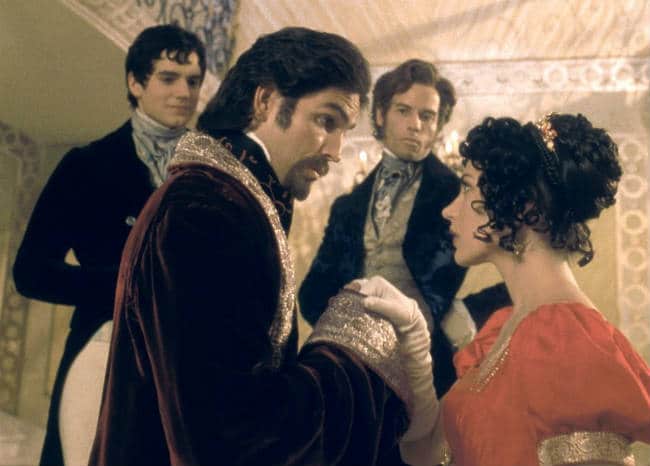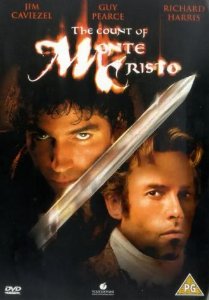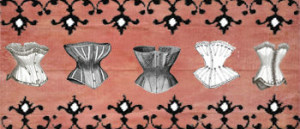The year was 2010. I had just finished reading Alexander Dumas’ epic masterpiece The Count of Monte Cristo for the first time and, although I loved the book and would still consider it one of my favorites today, I found myself less than enchanted with the ending. Dumas usually does endings so well, so I was surprised and disappointed.
Then, later that same year, I saw this film. Everyone had warned my class that the book and the movie were extremely different and that we would be disappointed if we watched it, but I wanted to watch it anyway. There were some things that were annoying (like the amount of time spent in prison and a few other details), but I loved the way it packed a monster of a book into a two-hour film that still managed to convey the spirit of the novel.
Even though some of the subplots were removed, the same sense of revenge, the fight for justice on an epic scale, the plotting and the betrayal all still come shining through. I think this comes partially from the acting by Guy Pearce, brilliantly conniving and slimy as Fernand Mondego, and from the way he and Jim Caviezel portrayed the friendship (and later enemy-ship) between the two men.
Of course, a large part of the credit for making this movie great must go to Jim Caviezel in his role as Edmond Dantes, the Count of Monte Cristo himself. Caviezel is able to play the wide-eyed and innocent Edmond, the cynical and angry prisoner and the vengeful and hate-filled Count. The range of emotion that the Count has to go through in the 16 years portrayed in the film is truly amazing to watch.
Dagmara Dominczyk plays Mercedes, Richard Harris plays Abbe Faria and a young Henry Cavill plays Albert Mondego. The other characters are also brilliantly cast, giving life and emotion to characters that I had already grown to love; they came dancing off of the pages and I loved that.
Now, the film itself. The year is 1814. Napoleon has been exiled to the island of Elba and the British are determined that he not escape. Of course, the young and idealistic Edmond Dantes and his ship find themselves in the area of Elba when the captain takes sick. Fearing the death of his superior, Edmond risks his life (and that of his best friend, Fernand Mondego, who insists on going with him) to get his captain to medical attention.
Fernand and Edmond prove to be a good team as they fight on Elba, and the knowledge that they have been friends for years makes their friendship seem sincere. Napoleon tells Edmond that he has a secret letter for a friend and asks him to deliver it for him in secret, which Edmond reluctantly agrees to.
The opening scene tells us, basically, everything that we need to know about our hero. He is idealistic, loving, loyal, and he tries to always see the best in everyone. Is this really a character flaw? No, not at all, but in Edmond’s case, it opens up the door to some serious problems.
Of course, when the ship arrives in Marseille we discover that not everything is happy in Edmond’s life, although he, himself, is happy. You see, Edmond has a fiancé who also grew up with the boys: Mercedes. She and Edmond are in love and Fernand is jealous of that. For his bravery, Edmond is made a captain, and Fernand is jealous of that as well.
The first mate, Danglars, and Fernand begin talking about Edmond. Here, the audience learns that Fernand saw the conversation between Napoleon and Fernand is, in addition to jealous about the other things, also is hurt by what he sees as a betrayal – Edmond not confiding in him.
The two turn Edmond into the Magistrate. Although it is apparent that he is innocent, Edmond is caught up in the schemes of the jealous and the ambitious as the prosecutor sends him to the Chateau d’If, the place where, as the Warden says, only the innocent actually go.
For thirteen years, he is there, kept alive by hate. For the first four years, he counts the rocks in his cell and maintains the carving that reads “God will give me justice.” Edmond begins to lose hope until another prisoner pops his head into his cell, the Abbe Faria.
Faria is trying to dig his way out and offers to teach Edmond everything he knows in exchange for Edmond’s assistance. The next nine years pass by in a blur, as the two men dig and Edmond learns economics, politics, languages, reading, writing, and swordplay, to name a few skills.

An accident results in the death of Faria, but this gives Edmond the opportunity to escape, taking with him a map that the priest has hidden all these years that leads to the location of the amazing treasure of Spada. He tells Edmond to use the treasure for good and reminds him that it doesn’t matter if he believes in God, He believes in him. There is more to live than revenge, he says, a lesson that a hate-filled Edmond does not want to hear.
When Edmond, older, wiser, and very jaded, finally returns home (he spent some time with smugglers, making valuable friends), he learns that things have changed quite a bit. His father is dead, Danglars took over the shipping business from Morrell, Villefort was promoted, Fernand became count, and Mercedes married Fernand a month after Edmond was arrested.
Brokenhearted, but armed with the unbelievable resources of the treasure of Spada and the assistance of his man Jacopo and his smuggler friends, Edmond fashions himself a new name and identity, that of the Count of Monte Cristo, and begins to plot out revenge against the men who ruined his life.
The plot is beautifully orchestrated. The first half of the film sets up Edmond’s back story and how he became the Count while the second half is focused on watching his plans unfold. Although the audience really isn’t given too many specifics about his plans, this keeps the plot moving and lets us keep guessing. It’s clever and fun that way.
The romance between Edmond and Mercedes is believable and really quite lovely. We first meet them as young idealist young people and later, Mercedes is the only person who can see Edmond in the Count. Her reaction tells the audience (and him) that she never stopped loving him and that the past sixteen years have been hard for her as well. When they meet again later, they are both older and more world-weary; her having suffered through a terrible marriage and him having suffered through a horrific prison experience.

Their romance is a nice contrast to the revenge plot; their love is something that is at odds with Edmond’s desire for revenge and Caviezel plays the conflicted Edmond wonderfully. Mercedes is the only one that can remind Edmond that there is more to life than revenge and that love also is worth living for, a role that Dominczyk plays beautifully, showing the love and faith of Mercedes in her interactions with other characters. Unexpected, moving and almost tragic, this love is still shown as true love, something that she held on to all her life and that he secretly carried as well.
Romance-wise, the ending of this film is basically what I wanted when I got to the end of the book. I remember getting to the end of the book and being very unsatisfied with the ending I got. This film is able to weave the romantic subplot throughout the book without overwhelming the main plot of revenge, rather, it enhances it and makes you believe in true love and it’s power to conquer everything else.
Although the ending of the film can be called a tad cheesy and predictable, it was also a very satisfying, both romantically and overall. The way the screenwriters tied everything together and made all the pieces fit at the end caused me to forgive those issues that I had had with the film at the beginning.
This film is one of my favorites, and one that needs to be looked at independent of its source material. Both are classics with the same basic plot, but they tell the story in different ways. Overall, there is swashbuckling action, adventure, romance, betrayal, beautiful clothes, an amazing score, and tons of brilliant one-liners. I think it’s a truly wonderful film.
OVERALL RATING
“The stuff that dreams are made of.”
ROMANCE RATING
“You pierce my soul. I am half agony, half hope.
I have loved none but you.”
ARE YOU A ROMANCE FAN? FOLLOW THE SILVER PETTICOAT REVIEW:
 Our romance-themed entertainment site is on a mission to help you find the best period dramas, romance movies, TV shows, and books. Other topics include Jane Austen, Classic Hollywood, TV Couples, Fairy Tales, Romantic Living, Romanticism, and more. We’re damsels not in distress fighting for the all-new optimistic Romantic Revolution. Join us and subscribe. For more information, see our About, Old-Fashioned Romance 101, Modern Romanticism 101, and Romantic Living 101.
Our romance-themed entertainment site is on a mission to help you find the best period dramas, romance movies, TV shows, and books. Other topics include Jane Austen, Classic Hollywood, TV Couples, Fairy Tales, Romantic Living, Romanticism, and more. We’re damsels not in distress fighting for the all-new optimistic Romantic Revolution. Join us and subscribe. For more information, see our About, Old-Fashioned Romance 101, Modern Romanticism 101, and Romantic Living 101.




I just completed reading the original book this year. I had liked the first half better than the 2nd half, but still enjoyed a lot. Thanks for the review Bailey. Will give this movie a try. Edmond Dantes will surely continue to inspire characters for years to come.
Thanks for commenting Rhea! I know what you mean about the book (though I still really love it). It’s really interesting to see what books and films can be traced back, in some way, to Count. I hope you enjoy the movie!
Worst adaptation of the book
Edmond and Fernand start out as friends, and Fernand frames him out of jealousy for his happiness and envy of his fiancee Mercedes. Making them friends adds a layer of insidiousness not present in the novel. Fernand in no longer a stranger but a trusted friend whom Edmond thought he could rely on. Edmond then spends the next thirteen years in prison. I liked that the film showed his despair. He tries to hang himself after a few years but only stops when he latches onto the idea that God will give him justice. Later, he will stop believing in God and be out for revenge for himself, not as Providence,. Then Richard Harris comes along as Faria. He’s the true bright spot in this film. He makes everything he touches sparkle. He has a lot of energy and is fun to watch. After Edmond breaks out, he makes friends with Jacopo. It seems like every time someone makes an adaptation, they give Edmond different friends: sometimes it’s Bertuccio, sometimes Ali gets in, sometimes Jacopo, sometimes Vampa, rarely Baptistin. There’s dissent over whether or not Luis Guzman was right in this movie. He sort of sounds like he doesn’t belong with his speech patterns, but I liked him. Edmond meets people from all over the world, so why not someone like Luis Guzman? He’s a friend/servant who tries to keep Edmond sane.
In the book, the Count manipulates events so that his enemies do themselves in. Their pasts come back to rob them of everything they achieved by wronging others. In the movie, Fernand would probably have done himself in without Monte Cristo’s help. The Janina campaign is gone; instead, Fernand has gambling problems and is an adulterer. Without the Count, he would surely have fallen into debt and ruin. Monte Cristo hardly needs to do anything here. Fernand should have been completely stable and so secure so that only the Count’s drudging up of his past could make him fall from glory. The film makes Fernand a wholy loathsome person, a guy with the word “villain” all but stamped on his forehead, who doesn’t even seem to love anyone or anything, stripping away his cleverness, cruelty, and love of family that existed in the book. He’s so nasty that he hardly even seems like a real person. There is one moment in this sequence, however, that is distinctly Monte Cristo–when Jacopo tells him about the bank debts and loans to Fernand, the Count says, “Make sure we own that bank by tomorrow.”
“Jacopo, I need you to go buy a few things. Some milk, a couple of horses, and the bank that Fernand uses. Thanks a lot.”
This is totally in line with book Monte Cristo: utter control and the funds to be able to to whatever he wants on a whim. It resembles the incident in the book where he asks his servant Bertuccio to buy Danglars’ horses at whatever cost and have them harnessed to his carriage by five…when it’s two. And Bertuccio gets it done. That’s power. Caviezel’s Count is also charming, dresses exotically, and speaks well. He makes his entrance to the people of Paris by going forward in time, bringing back some Cirque du Soliel dancers, and having them bring down his balloon in front of his mansion. He gets out and greets the people with a flat, “Greetings.” That’s the Count. Originality and a cool demeanor. Yes, I believe that this Count could carpet a cave and talk plainly about it.
Caviezel’s Count does have the charisma and exoticism that the part needs. However, he fails on another major point. The Count exacts revenge and rides off happily into the sunset with Mercedes (and in this case, his biological son as well). His enemies get punished, no innocents are harmed, Monte Cristo has no regrets, and he’s thoroughly rewarded for his behavior. While Caviezel displays the charisma and originality of the Count, he fails to show the darker, sadistic side. If the Count were not so diabolical, he would probably never carry out a revenge scheme that must have taken the whole nine years between his escape and arrival at the Rome Carnival to plan. He would buy a villa, retire to Florence, start a hotel, buy an old boat, and going out charter fishing every day. Without the nasty side, he would forgive his enemies and live his life in peace and luxury. This character change is a fault of the writing instead of the acting, however. The writers wrote out the events that come out of the Count’s sadistic planning and the pleasure that the Count gets from watching people suffer as he did. Without all the facets of the Count’s character, the story loses some impact, as we don’t get to see how vengeance changes him for the worse. He also loses some appeal: he’s a good guy and that’s it. He doesn’t have that villainous streak that makes him appealing and appalling. He claims at one point that he will kill Albert, but he doesn’t seem like he would actually do it. Dumas wrote a great character with charm, talents, and demons. There’s no need to change him.
The revenge plans are changed beyond all recognition. I read the book after the movie and had not a single part of the vengeance spoiled for me. Villefort’s and Danglars’ families are omitted, leading the Count to take revenge solely on them. This contributes to the Count’s softer character: no innocents have a chance to be harmed, which is part of what causes the audience to dislike the Count as the book goes on. The only innocent who has a chance of being harmed is Albert, as the Count says on the island that he wants revenge on Mercedes as well for marrying Fernand, whereas in the book he forgives her. He doesn’t make his enemies suffer enough. Does he make Villefort slowly lose his mind over a series of months from the deaths of his hosehold and then reveal the illegitamate child he had with Mde. Danglars to all Paris? No. Does he mess with the telegraphs and stock market for weeks, then kidnap Danglars and starve his money out of him? No. Does he set up a scandal for Fernand, ruin his name, make his wife and child turn against him, and almost kill the child after setting him up to challenge him to a duel so that he has a legal excuse to murder him in front of his parents? No. That’s making them suffer. Life without the things that they gained from betrayal.
I saw the movie several times and I’m still not sure what happens to Danglars. His love of money is what the Count should make work against him, but I think he gets nearly killed and arrested instead. Hmm. So what was the Count’s huge scheme against him? Just imprisonment? That’s not nasty enough for the Count, nor is it fitting for a banker who could buy himself comfort (good food, blankets, wine, time outside, letters) in prison. Villefort is taken to jail, which seems a fitting punishment for a procureur du roi who unjustly sent a man to prison to save his own pride and position. I’m still a bit miffed that Villefort’s family was omitted, because he cared for them just as much as his position when it came down to the wire, and also that greatly shortens the time that Villefort slowly suffers and loses his mind, but since they’ve been cut out, Villefort’s position and freedom are all he has left, and those are stripped from him. His fate gets a pass (though he’d probably be able to buy comfort in prison too).
Fernand’s doesn’t. His fate is quite sad in the book. He kills himself after losing the last things he loved–his wife and son. When they leave without saying goodbye or looking back, he sobs horribly and shoots himself. The film changes all of this into something far less satisfying and complex. For one, Fernand begins life as a count’s son and inherits the title and fortune, omitting all of the backstabbing he had to do in the book to obtain his title, money, prestige, and family. Then, Fernand loses his money and ends up dueling the Count, who reveals himself as Edmond. He actually has a pistol loaded and aimed at Edmond when Mercedes and Albert show up out of nowhere. Fernand then shoots Mercedes because he thinks that it will damage Edmond the most. (For the record, when he said that line, I said, “Shoot him in the head!” Even though a head-shot would have been hard to pull off in those days. Moving along.) Edmond actually wants to show mercy to Fernand before Mercedes is shot and is willing to leave Fernand ruined but alive. Once Fernand shoots Mercedes and prompts Edmond to fight, Edmond is not accountable for killing Fernand. After all, Fernand started the fight. Thus, we get a feel-good ending where the bad guy who doesn’t fight fair and was given a chance to start over is killed by the good hero who was willing to show mercy. I think we’ve seen this cliche enough and it’s time to put it in the grave.
A major change: Albert is Edmond’s son. What. The. Crap. Mercedes and Edmond had sex before marriage; she got pregnant and married Fernand to save face. Albert accepts Edmond as his father with no questions. This change brings up the idea that the biological father is more important than the father who raised the child. I’ve seen it done many times where a child finds out that its “real father” is not the man who has raised it and suddenly hates that father and goes to find the biological one (coughWarriorCatscough). Fernand might not have been a great father, but he was still there in Albert’s life, and Albert must have cared about him somewhat. In fact, he does, as in their final scene together he asks, “Forgive me, Father,” for being so stupid not to see the Count’s plans earlier. We don’t even see most of their lives; maybe Fernand was a great father for several years and only recently declined in his affection. Albert has lived with Fernand for sixteen years. Suddenly he has no problem going to live with a guy whom he hardly knows, who by the way killed the father who raised him? It would have been more interesting if Albert had been appalled by the whole affair and decided to leave France altogether, or at least get away as fast as he possibly can from these weird people who really can’t let go of the past. That would inject some reality into the sappy ending.
Yes, this picture does it too: Edmond and Mercedes reunite. I explained why this doesn’t work in my earlier reviews, but in a nutshell, the two have changed so much in twenty-four years that they’re not the same persons anymore, and living together would only remind them of the happiness they wanted to have but can’t now. In this version, they rekindle their love, decide to leave the country together, and even have sex again after Mercedes comes to see Edmond after recognising him at her party. Now, that plot thread may have gone somewhere if Mercedes had told Fernand that she slept with the Count of Monte Cristo; Fernand’s cheated on her, now she’s cheated on him. He couldn’t satisfy her, so she looked to the new, mysterious nobleman. Would Fernand care or not? Would he throw her out of the house…or feel better now that she’s had an affair too and can’t call him out for his infidelities? Would their marriage have finally split, or would Fernand have decided to try to be a good husband again? The film doesn’t even explore this topic. Mercedes just tells him that Edmond is actually Albert’s father, and Fernand hardly even cares, like he’s guessed it already or was just waiting for an excuse to leave his disappointment of a family and is happy to have one. Gosh, this film doesn’t do anything interesting.
A few little mistakes that bugged me: I can believe that the Count has beautiful teeth: he definitely has the money to have dentures made. But how in the world does that cheap string stay on Mercedes’ finger for over a decade? How do Edmond and Faria stay alive on one tiny bowl of soup per day? And how does Edmond almost become a ship’s captain without being able to read and write? Another tiny one is that none of the characters appear to age. Book Edmond doesn’t recognise himself after looking at his reflection fourteen years after the start of his imprisonment, so none of his friends could be expected to recognise him twenty-four years later. This movie has sped up the time to sixteen years, yet still none of them look it. Error in the makeup department, perhaps?
This film very basically follows the book with some plots and characters, but fails to bring alive the spirit of the novel. It should have been altered a little more and made into an original story with a different title and different character names. Omitted from this telling are the rather important characters Haydee and Andrea. They are essential as Chekhov’s gunwoman and gunman, so without them the film has to construct a new revenge scheme that doesn’t resemble the book’s in execution or spirit. I’m upset that this movie is called Alexandre Dumas’ The Count of Monte Cristo. This is not Alexandre Dumas’ The Count of Monte Cristo. It’s something else entirely. It contains none of my criteria for an adaptation that follows the book in theme and spirit and fails to capture even the essence of the classic book.
The 1979 version with jacques weber is the best version.
The ending remains the same as the novel. Mercedes lives her life alone in Marseilles, Monte Cristo sails off with Haydee, and Max and Valentine are left the fortune. I am very pleased that this version did not follow the Edmond-and-Mercedes-get-back-together cliche that other versions fall victim to. The two lovers are so different, too changed from their experiences. The Edmond they knew is gone, so little does he resemble the suave and bitter Count. They want each other as they were twenty-some years ago, which cannot happen. If they were to get together, they would not be happy. They would have too many painful memories, memories of a time when they would have been happy, and broken fantasies of what could have been a happy life together. They would be trying to live out a dream that they had many years ago, and the results would be a travesty, a farce of love, two lovers trying to bring back what they had, though their characters have changed. They’ve turned into people they hardly recognise and no longer resemble the ones they loved. Many adaptations forget these essential dynamics and have the two reunite to give the story a more happy ending. However, this story needs bittersweetness as part of its message on the destructiveness of revenge and betrayal. As well, it’s more realistic than a happy ending, and even though the book is a Romantic novel, it still has tinges of Realism to make the themes shine through. The Count also sees that innocent children suffer from his plans–he’s visibly saddened by Edward’s death and makes amends by rescuing Valentine.
The movie is bad and the novel is unrealistic.
nothing better than comparing real life with weak hollywood movies.
Russian writer Aleksandr Solzhenitsyn. he was arrested for political reasons like Edmond’s. While imprisoned, his first love Natalia Alekseyevna Reshetovskaya starts a relationship with a co-worker. When he is released and completes his rehabilitation, he will prefer his Haydee, Natalia Dmitrievna Svetlova.
Nothing better than real life to refute hollywood nonsense.
Do you know when a romance between Edmond and Mercedes would happen in real life? Never.
We saw in real life the victory of haydee, personified by Natalia Dmitrievna Svetlova. When Solzhenitsyn chose his Haydee instead of staying with his permecedes with his first love he wanted.
We are going to have a new adaptation in 2024 and we are going to throw this adaptation into the dustbin of history. A French adaptation.
Modern North American writers and screenwriters never create masterpieces because they trade realism for Disneyfication of story.
“The movie is bad and the novel is unrealistic.”
The 2002 film is mediocre and its ending unrealistic. It’s not on the same level as the book and if it were an independent film, it would still be terrible.